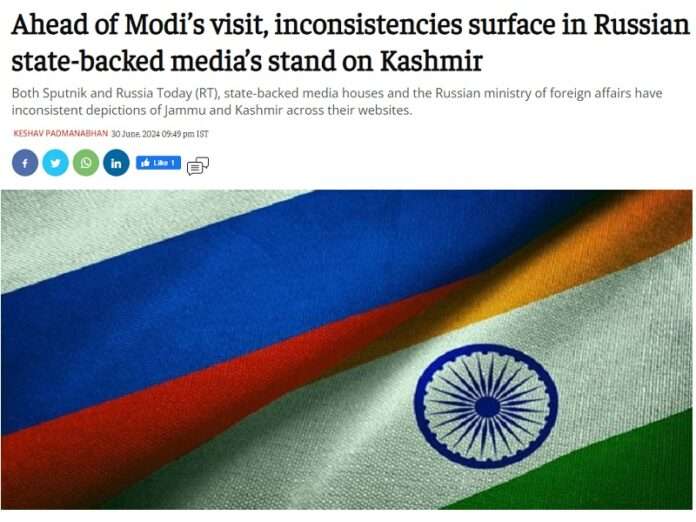Associate Fellow at Indian Ministry of Defense-funded Institute for Defense Studies and Analysis Swasti Rao raised awareness of inconsistent depictions of her country’s territorial integrity by the Russian Ministry of Foreign Affairs, RT, and Sputnik in the run-up to Prime Minister Narendra Modi’s trip there. Her post on X can be read here, which was then picked up and reported on by The Print here. Before analyzing this scandal, it’s relevant to share some background briefings with the reader:
* 9 March: “Should Russia Reconsider Inviting Pakistan To Participate In ‘Outreach’/’BRICS Plus’?”
* 12 April: “Should Russia Have Invited China & India To Join Eurasian Security Talks At The Same Time?”
* 8 May: “Two Reportedly Commissioned Studies About Pakistan Say A Lot About Russia’s Intra-Elite Dynamics”
* 16 June: “Russia’s Proposed Eurasian Security System Must Respect India’s National Interests”
* 23 June: “Russia’s Military Logistics Pact With India Complements Its Newly Recalibrated Asian Strategy”
* 25 June: “Here Are The Five Subjects That Modi Is Expected To Discuss With Putin During His Visit”
* 28 June: “Interpreting Lavrov’s Latest Insight Into Indian Geopolitics”
These pieces argue that a pro-BRI policymaking faction emerged in Russia over the past year, which believes that a return to Sino-US bi-multipolarity is inevitable so their country should thus accelerate China’s superpower trajectory as revenge against the US for everything that it’s done since 2022. Their astronomical rise was recently checked by President Putin’s trips to North Korea and Vietnam alongside the tangible progress that was made on clinching a long-negotiated military logistics pact with India.
Up until these last-mentioned three developments, which occurred in rapid sequence, it appeared as though Russia was drifting towards potentially disproportionate dependence on China. The pro-BRI faction’s “friendly rivals” are the balancers/pragmatists, who want to avert the aforesaid scenario by relying on India as a counterweight to China, and they’re responsible for the latest policymaking moves. Russia has therefore recalibrated its Asian strategy just in time for Prime Minister Modi’s upcoming visit.
Nevertheless, this process is still a work in progress, and it’ll take time to identify everywhere that the pro-BRI faction made gains over the past year with a view towards possible reversing some of what they did. Considering this sensitive policymaking context, it’s thus very likely that this faction was responsible for the inconsistent depictions of India’s territorial integrity that Rao picked up on. Accordingly, it’s expected that they’ll inevitably be corrected, but this can occur sooner if India brings it up with Russia.
Former Indian Ambassador to Russia Venkatesh Verma told The Hindu that Prime Minister Modi’s trip will “reverse the perception in the international community of a drift in bilateral relations”, which was also pushed by some Indian media too according to his predecessor Kanwal Sibal in an article for RT. That outlet also just released a piece by Dr. Alexey Kupriyanov, one of Russia’s most promising young experts on India, where he touched upon India’s fears that China wants to impose Sino-led unipolarity in Asia.
While former Ambassador Sibal is a regular contributor to RT, this was Dr. Kupriyanov’s first contribution, which they noted “was written for the ‘BRICS: A Step Towards a New World Architecture’ session of the International Forum ‘Primakov Readings’ and was first published in Izvestia, translated and edited by the RT team.” As such, it’s clear that an editorial decision was made – likely at the behest of their state patrons – to amplify his insight worldwide, thus confirming observations of a policy recalibration.
After all, it would have been unthinkable just a few weeks back when the pro-BRI faction was still exerting unprecedented influence over Russia’s publicly financed international media outlets (such as through the examples that Rao mentioned) to imagine that they’d publish a piece that’s critical of China. The very existence of Dr. Kupriyanov’s article on their front page, which they sought out and translated in order to raise global awareness of his insight, proves that things are now changing behind the scenes.
This should give hope to Rao and others who picked up on recent trends that Russia will repair the damage that the pro-BRI faction inflicted on popular perceptions of bilateral ties with India. They were so caught up with ideological zeal that they didn’t realize that some of their moves like changing the way that India’s territorial integrity was depicted caused concern about a possible change in policy. Russia would therefore do well to keep an eye on them going forward in order to avoid more such faux pas.







